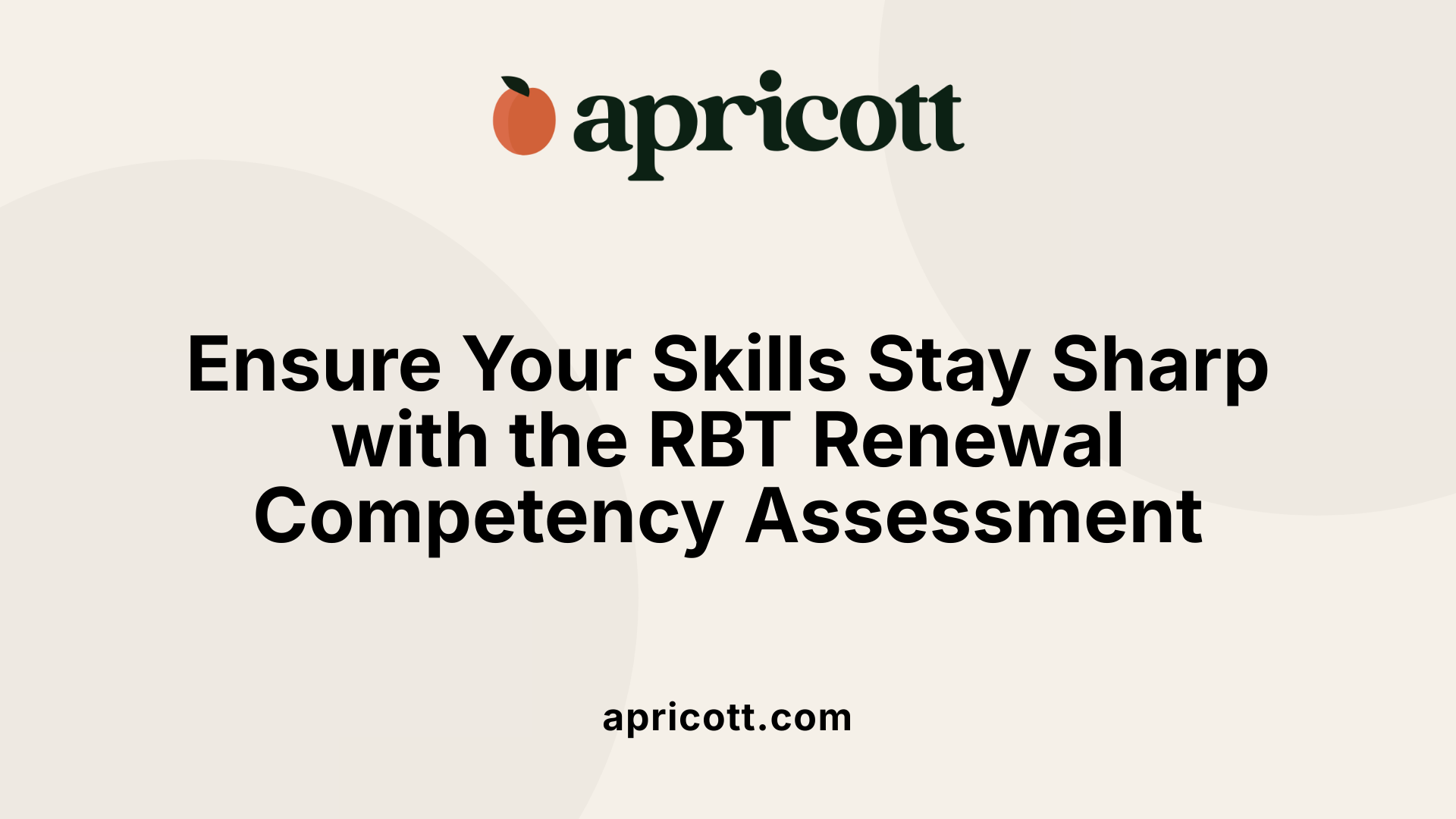December 2, 2025
Navigating the RBT Renewal Application: Essential Insights for Behavior Technicians
Maintaining an active Registered Behavior Technician (RBT) certification is vital for professionals working in applied behavior analysis (ABA) therapy, especially those supporting individuals with autism and developmental disabilities. The renewal application process not only ensures ongoing competency but also upholds the quality and ethics of behavioral services. This article explores the comprehensive requirements and implications of the RBT renewal application, providing a detailed guide for practitioners and stakeholders.

Applied Behavior Analysis (ABA) therapy is a scientifically grounded approach aimed at improving meaningful behaviors and reducing those that may be harmful or disruptive. The method relies on principles of learning and behavior, such as positive reinforcement and conditioning, to shape desired outcomes. It focuses on analyzing behavior patterns by evaluating antecedents, behaviors, and consequences—commonly known as the A-B-C model—in order to tailor interventions to individual needs.
ABA therapy is especially prominent in treating individuals with autism spectrum disorder (ASD), accounting for approximately 75% of the focus for Board Certified Behavior Analysts (BCBAs). By promoting skills in communication, socialization, academic learning, and self-care, ABA supports increased independence and improved quality of life for those on the spectrum.
ABA interventions are versatile and can be implemented in many environments, including homes, schools, hospitals, and community settings. Therapists may use structured techniques like Discrete Trial Teaching or naturalistic methods such as Pivotal Response Treatment. Sessions often involve observations, measurement, and continuous adjustments to ensure effective behavior modification.
Behavior analysis serves as the scientific foundation of ABA, focusing on understanding the principles of learning and behavior to facilitate meaningful change. Through this approach, therapists help individuals adapt to their social environments by reducing unwanted behaviors and fostering positive reactions, ultimately enhancing social integration and everyday functioning.

Registered Behavior Technicians (RBTs) are frontline providers of Applied Behavior Analysis (ABA) therapy. They directly implement behavior intervention plans designed by Board Certified Behavior Analysts (BCBAs) or Assistant Behavior Analysts (BCaBAs). RBTs engage with clients to promote skill acquisition and behavior reduction through evidence-based techniques under close supervision. Their responsibilities often include data collection, following treatment protocols, and assisting clients in applying behavioral strategies in day-to-day settings.
RBTs work under the supervision of certified BCBAs, who oversee the development, assessment, and adjustment of treatment plans. BCBAs ensure the quality and ethical standards of interventions by guiding RBTs through clinical direction. This relationship allows BCBAs to maintain accountability for treatment outcomes while allowing RBTs to focus on implementation, making the therapy process collaborative and structured.
RBTs provide one-on-one therapy to individuals with developmental disabilities like autism spectrum disorders. Their role includes applying behavior modification skills such as discrete-trial teaching, prompting, and token economies. RBTs collect precise data on client progress, which informs ongoing treatment decisions by supervising BCBAs. However, RBTs are not authorized to design treatment plans or practice independently; their scope remains supportive and implementation-focused.
Unlike BCBAs, who require graduate degrees and supervised fieldwork, RBTs need a high school diploma or equivalent, complete specialized RBT training, and pass a competency assessment known as the RBT Renewal Competency Assessment. Continuing education is also mandatory to maintain certification and demonstrate ongoing proficiency in critical skills. This accessible pathway allows more individuals to support behavioral therapy services effectively while upholding professional and ethical standards.
ABA therapy is typically provided by this team of professionals—BCBAs, BCaBAs, and RBTs—each playing distinct but complementary roles. Their collaboration ensures that individuals receive tailored, evidence-based interventions aimed at improving communication, social skills, and reducing harmful behaviors.

The RBT (Registered Behavior Technician) Renewal Competency Assessment ensures that RBTs maintain proficiency in essential behavior technician skills. This assessment is a critical component for RBTs to keep their certification active, demonstrating ongoing competence in delivering quality services under BCBA supervision.
The assessment evaluates a wide range of core competencies required in behavior analysis practice. Key tasks include:
Alongside these technical skills, the assessment also covers professionalism, client dignity, boundary setting, supervision standards, and clinical direction.
Assessments can be conducted in multiple sessions and through various methods, including in-person observation, virtual sessions, or review of recorded videos. These flexible formats accommodate different work environments and client needs. Importantly, the assessment must be completed within 45 days before the RBT's certification expires to ensure timely renewal.
A BACB certificant—such as a BCBA or BCBA-D—must oversee the assessment process. This professional is responsible for signing off on the evaluation, ensuring its quality, and maintaining detailed records for at least seven years. This oversight guarantees adherence to ethical and professional standards throughout the renewal process.

To maintain Registered Behavior Technician (RBT) certification, individuals must complete continuing education units (CEUs) regularly. These CEUs are essential to keep RBTs updated on the latest techniques and standards in behavior analysis. Typically, RBTs need to demonstrate ongoing proficiency by completing a Renewal Competency Assessment, which helps ensure they maintain critical behavior technician skills. Additionally, license renewal cycles occur every two years, aligning with ongoing educational commitments.
Ethics play a foundational role in the renewal process of RBT certification. Certified technicians are required to adhere strictly to ethical standards set forth by the Behavior Analyst Certification Board (BACB). These requirements emphasize maintaining client dignity, respecting professional boundaries, and following proper supervision and clinical direction guidelines. Adherence to ethics is verified through assessments and continuing education, making sure RBTs uphold high professional integrity.
Cultural competency and diversity training are now mandatory components of continuing education for behavior analysts, including RBTs. These trainings focus on recognizing and respecting differences in culture, diversity, equity, and inclusion, which are vital for delivering effective and respectful client-centered interventions. This emphasis helps professionals better understand their clients' social contexts and provides more tailored, sensitive services.
Ongoing professional development for RBTs supports the evolution of their skills and knowledge to meet emerging needs in applied behavior analysis. Regular training and ethical reinforcement ensure that RBTs provide quality care, adapt to changes in scientific research, and respond effectively in diverse and dynamic environments. This development fosters career growth and helps maintain public trust in behavior analysis services.
| Aspect | Description | Reason for Importance |
|---|---|---|
| Continuing Education Units (CEUs) | Required units completed every two years | Keeps technicians current with evidence-based practices |
| Ethics Compliance | Adherence to BACB ethical standards | Ensures professionalism and client respect |
| Cultural Competency Training | Instruction on diversity, equity, and inclusion | Enhances client-centered care and responsiveness |
| Renewal Competency Assessment | Demonstration of skills every renewal cycle | Verifies ongoing proficiency in behavior technician tasks |

To renew your Registered Behavior Technician (RBT) certification, you must submit all required documentation as specified by the Behavior Analyst Certification Board (BACB) and your state's regulatory board if applicable. This includes proof of completed continuing education units (CEUs), evidence of ongoing competency assessments, and any culturally relevant training in diversity, equity, and inclusion as mandated.
Renewal applications must be accompanied by the required fee payment. It is crucial to adhere to the renewal deadlines, which occur every two years on January 1 of each odd-numbered year. Late or missed payments can lead to automatic suspension of your certification, so timely submission is essential.
As part of the renewal process, applicants must undergo a criminal background investigation. This ensures that all RBTs continue to meet the ethical and professional standards required to work with vulnerable populations.
Failure to submit your renewal application, pay fees on time, or complete required continuing education may result in suspension or revocation of your RBT certification. Additionally, noncompliance can trigger disciplinary procedures including investigations and possible sanctions, impacting your eligibility to practice.
Keeping up with these steps ensures that your certification remains active and that you can continue to provide high-quality behavioral interventions under supervision.

The field of Applied Behavior Analysis (ABA) is experiencing significant growth, with employment for behavior analysts projected to increase by 58% from 2023 to 2024. This rapid expansion reflects a growing recognition of the benefits of ABA interventions, especially for individuals with developmental disabilities such as autism spectrum disorders.
Due to this heightened demand, maintaining certification has become increasingly crucial for professionals like BCBAs and Registered Behavior Technicians (RBTs). The need for ongoing competency assessment and continuing education underscores the importance of upholding high standards to ensure quality care. Certified professionals must renew their credentials biennially by completing continuing education units and meeting ethics standards.
States including California, Massachusetts, Texas, New Jersey, and Florida lead the surge in ABA employment opportunities. These regions offer greater availability of jobs, reflecting a high concentration of healthcare agencies, educational institutions, and community organizations investing in behavior analysis services.
For RBTs, the demand translates into a rigorous renewal process such as the RBT Renewal Competency Assessment. This assessment guarantees sustained proficiency in vital behavior technician skills, which is essential when working under BCBA supervision to implement behavioral treatment plans effectively.
| Aspect | Details | Implications |
|---|---|---|
| Job Growth | 58% increase from 2023 to 2024 | More career opportunities and need for more qualified staff |
| Certification Maintenance | Renewal every 2 years with continuing education and ethics requirements | Ensures skill retention and professional accountability |
| Regional Demand | High in CA, MA, TX, NJ, FL | Job seekers may target these states for employment |
| RBT Renewal Competency | Regular competency assessments | Maintains quality of support delivered under BCBA supervision |

A typical ABA therapy session is a structured yet dynamic environment aimed at fostering skill development and reducing unwanted behaviors. Sessions often start with rapport-building and initial assessment activities to understand the child's preferences and current behavior patterns.
Therapists use play-based, engaging methods such as interactive games, art activities, sensory play, and role-playing. These activities are designed to target specific goals including communication, social skills, self-care, and behavior reduction.
ABA therapy sessions heavily rely on evidence-based techniques derived from applied behavior analysis principles, such as positive reinforcement to encourage desirable behaviors. Therapists also apply the antecedent-behavior-consequence (A-B-C) model to analyze behaviors and develop interventions by identifying triggers (antecedents) and consequences.
Registered Behavior Technicians (RBTs) play a critical role in implementing the designed treatment plans under BCBA supervision. They deliver direct one-on-one intervention, measure and record behaviors, and ensure fidelity to prescribed behavior plans.
Data collection is integral to every session, enabling continuous monitoring of the client’s progress. Therapists use this data to inform adjustments and refine interventions, ensuring interventions remain effective and personalized.
Parent and caregiver involvement is often encouraged to support generalizing skills across settings beyond therapy sessions.
| Aspect | Description | Purpose/Benefit |
|---|---|---|
| Rapport-Building Activities | Games, art, sensory play to engage and motivate | Establish trust and gather behavioral insights |
| Positive Reinforcement | Rewarding desired behaviors | Increase occurrence of target behaviors |
| A-B-C Analysis | Identifying antecedents and consequences of behavior | Understand triggers and maintainers of behavior |
| RBT Support | Implementing intervention protocols, data collection | Ensure consistency and accurate progress tracking |
| Data Collection | Recording behaviors and responses during sessions | Monitor effectiveness and guide treatment plans |

To become a BCBA, candidates must earn a graduate-level degree in behavior analysis or a related field from an accredited program. This advanced education is a foundational step, providing comprehensive knowledge in applied behavior analysis principles.
Candidates are required to complete between 1,500 and 2,000 hours of supervised fieldwork. This practical experience allows them to apply theoretical knowledge in real-world settings under the guidance of certified supervisors.
After meeting educational and practical experience prerequisites, candidates must pass the BCBA certification exam. The exam assesses competencies across behavior change procedures, ethics, behavioral assessment, and supervision. Administered by Pearson VUE, the exam follows the BCBA® Test Content Outline to ensure thorough evaluation of critical skills.
BCBA certification must be renewed every two years. Renewal includes completing required continuing education units and adhering to professional ethics standards to maintain certification status. The process ensures that BCBA professionals stay updated on best practices and evolving standards in behavior analysis.
This structured pathway guarantees that behavior analysts uphold high standards of practice through rigorous education, hands-on experience, assessment, and ongoing professional development.

ABA practice is regulated through formal legal statutes such as the Nevada Revised Statutes (NRS) Chapter 641D, which establish licensing boards responsible for overseeing behavior analysts, assistant behavior analysts, and registered behavior technicians (RBTs). These boards ensure that practitioners meet professional standards by requiring current certification through the Behavior Analyst Certification Board (BACB).
Applicants must submit an application, pay applicable fees, undergo a criminal background check, and complete continuing education to qualify for licensure or registration. Licenses and registrations require renewal every two years, due on January 1 of odd-numbered years. Failure to pay renewal fees results in automatic license suspension. Continuing education mandates include training on cultural competency, diversity, equity, and inclusion to maintain or improve professional proficiency.
The regulatory framework includes established disciplinary procedures with specific grounds for sanctions. These encompass investigations, hearings, and appeals designed to uphold professional accountability. Measures such as temporary practice restrictions and subpoenas ensure compliance with ethical and legal standards.
Regulations maintain strict confidentiality of records related to licensure and disciplinary matters. Certified professionals must keep detailed documentation of assessments, treatments, and supervision for at least seven years to guarantee quality assurance and facilitate regulatory oversight.
Renewing RBT certification is a critical process that safeguards the quality and ethical standards of ABA therapy services. By completing the renewal competency assessment, fulfilling continuing education requirements, and adhering to regulatory mandates, RBTs affirm their commitment to professional excellence and client welfare. As demand for ABA professionals continues to grow, maintaining up-to-date certification not only enhances career prospects but also ensures that individuals with autism and other developmental challenges receive the most effective, evidence-based care possible.